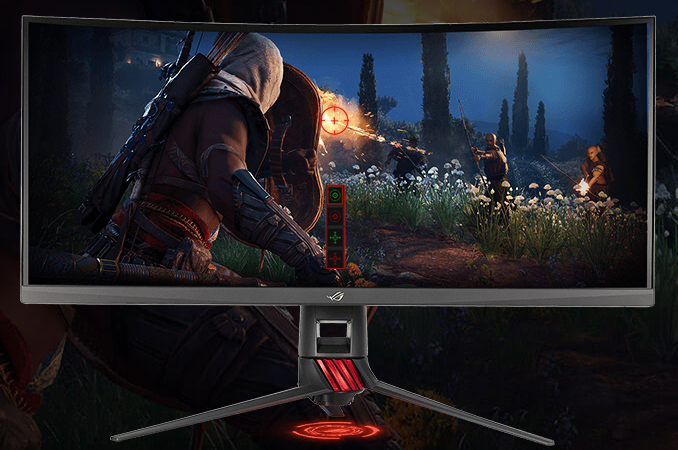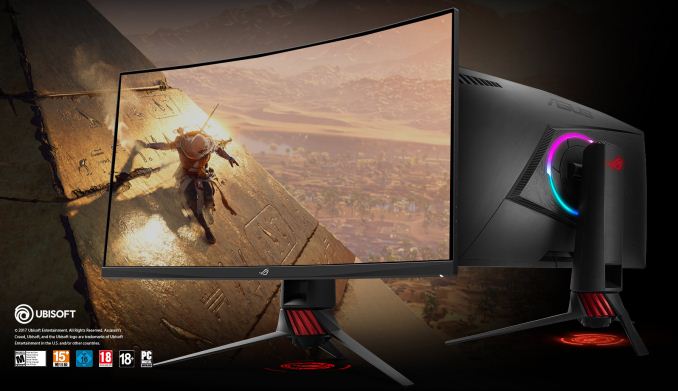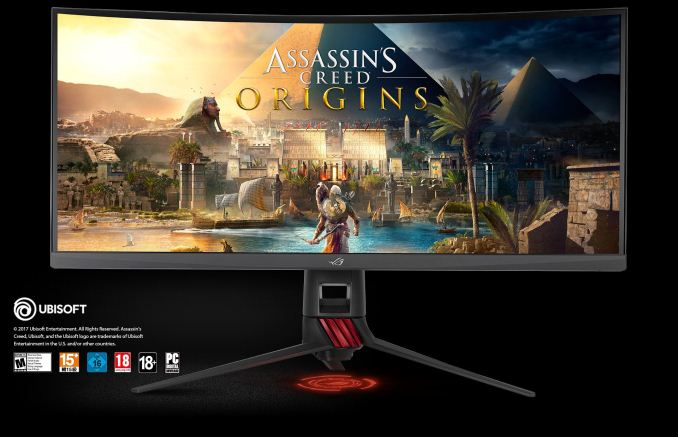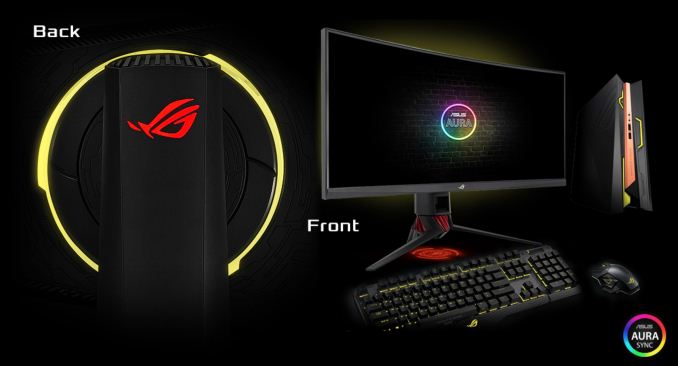ASUS Announces ROG Strix XG32VQ and ROG Strix XG35VQ: Large, Curved, & Fast
by Anton Shilov on November 28, 2017 11:00 AM EST
ASUS has quietly added two large curved displays to its lineup of ROG gaming monitors. The new LCDs are based on VA panels and boast a 100 Hz and 144 Hz refresh rates (depending on the model) along with AMD’s FreeSync and ASUS’s ELMB. The ROG Strix XG32VQ features a mainstream 16:9 aspect ratio display, whereas the larger ROG Strix XG35VQ is an ultra-wide curved display that promises to be cheaper than the last year’s flagship ROG Swift PG348Q. Following the recent trends, both monitors also come with the ASUS Aura Sync RGB lighting.
As curved monitors are gaining traction on the market, ASUS and other manufacturers are expanding their lineups to address various customers with such products. The ROG Strix XG32VQ belongs to the upper mid-range segment of the gaming market and offers a rather interesting combination of features. The monitor relies on a 31.5” VA panel with a 2560×1440 resolution, 1800R curvature, 16:9 aspect ratio, as well as refresh rates between 48 Hz and 144 Hz, courtesy of AMD’s FreeSync technology. The VA panel can reach 300 nits of brightness, a rather high contrast ratio of 3000:1, a 4 ms response time, 178°/178° viewing angles and so on. Typically, VA panels are not known for the most accurate color reproduction and this particular one can display 16.7 million of colors. Nonetheless, ASUS claims that its color gamut is wider than the sRGB. As for connectivity, the XG32VQ has a rather standard set of connectors by today’s standards: an HDMI 2.0 port, a DisplayPort 1.2 input, a Mini DisplayPort 1.2 input, and a 3.5-mm audio jack for headphones.
Meanwhile the ROG Strix XG35VQ is a larger monitor featuring a 21:9 aspect ratio, but lower refresh rates of up to 100 Hz. The 35” model is based on a VA panel with a 3440 × 1440 resolution, 2500:1 contrast ratio, 300 nits brightness, and a 4 ms grey-to-grey response time. Besides AMD’s FreeSync (that works in the range between 48 and 100 Hz), the display also supports ASUS’ ELMB technology designed to make fast-paced scenes look sharper. The connectivity scheme of the XG35VQ is a bit different than on the XG32VQ model: the large monitor has a DisplayPort 1.2 input, an HDMI 1.4 input, and an HDMI 2.0 input, as well as 3.5-mm headphone jack.
From ergonomics standpoint, the two monitors are very similar: both can regulate height, tilt, swivel or can be attached to a VESA wall mounting. As for ASUS’ proprietary enhancements, such as GamePlus OSD features and GameVisual modes that adjust LCD for a particular game genre, they are supported, but with some variability between models. Finally, to make the new ROG Strix monitors look like other latest ROG-branded models, the new LCDs also feature adjustable ROG signature projection on the bottom as well as the Aura Sync RGB LEDs on the back. The latter can automatically match their behaviour with the Aura Sync LEDs inside the host PC and peripherals.
| ASUS ROG Strix XG32VQ and ROG Swift XG35VQ Displays | |||
| ROG Strix XG32VQ | ROG Swift XG35VQ | ||
| Panel | 31.5" VA | 35" VA | |
| Native Resolution | 2560 × 1440 | 3440 × 1440 | |
| Refresh Rate | 144 Hz | 100 Hz | |
| Dynamic Refresh Rate | Technology | AMD FreeSync | |
| Range | 48 - 144 Hz for DP, HDMI | 48 - 100 Hz for DP, HDMI | |
| Response Time | 4 ms (gray-to-gray) | ||
| Brightness | 300 cd/m² | ||
| Contrast | 3000:1 | 2500:1 | |
| Color Gamut | 125% sRGB | 100% sRGB | |
| Viewing Angles | 178°/178° horizontal/vertical | ||
| Curvature | 1800R | ||
| Inputs | 1 × HDMI 2.0 1 × DisplayPort 1.2 1 × Mini DisplayPort 1.2 |
1 × HDMI 1.4 1 × HDMI 2.0 1 × DisplayPort 1.2 |
|
| USB Hub | 2 × USB 3.0 | ||
| Audio | 1 × 3.5-mm audio jack for headphones | ||
| Proprietary Enhancements | Trace Free Technology Color Temperature Selection: 4 Modes GamePlus Modes: Crosshair/Timer/Display Alignment Low Blue Light: Yes VividPixel: Yes GameVisual Modes: Scenery/Racing/Cinema/RTS/RPG/FPS/MOBA/sRGB |
ULMB Trace Free Technology Color Temperature Selection: 4 Modes GamePlus Modes: Crosshair/Timer/Display Alignment Low Blue Light: Yes GameVisual Modes: Scenery/Racing/Cinema/RTS/RPG/FPS/sRGB GameFast Input |
|
| Power Consumption |
Idle | ~0.5 W | |
| Active | 43 W at 200 cd/m² | ||
| Detailed Information | Link | Link | |
ASUS is not disclosing when exactly it plans to start selling the two monitors. Since the company has published presumably final specs of the new units, they are presumably set to be available rather sooner than later. In the meantime, ASUS’ first ultra-wide curved monitor ROG Swift PG348Q based on an IPS panel and offering several advantages over the new displays is now available for less than $1,000.
Related Reading:
- ASUS Starts to Ship Its First Curved Ultra-Wide Display: ROG Swift PG348Q
- ASUS Launches ROG Swift PG27VQ: Curved 27-inch LCD with 165 Hz G-Sync & RGB Lighting
- ASUS ROG Strix XG27VQ Available: 27” Curved, FHD@144Hz & FreeSync w/ELMB
- Alienware Announces AW3418DW and AW3418HW Ultra-Wide Curved Displays
- LG’s 34UC89G 21:9 Curved Display with G-Sync, 144 to 166 Hz, Available for $999
- Acer Predator Z35P Available for Order: Curved 35" with 3440×1440@120 Hz and G-Sync
- Acer Predator Z271UV Gaming Monitor: 1440p, 144-165Hz, G-Sync, Eye Tracking
- AOC Expands AGON Family with Curved AG322QCX and AG272FCX 144 Hz Displays
- AOC Announces the AGON AG352UCG 21:9 Curved Display: 35", 3440×1440, 100Hz with G-Sync
Source: ASUS













34 Comments
View All Comments
jstein - Tuesday, November 28, 2017 - link
Ugh, another freesync monitor with the same specs as year old gsync monitors, but no word on when the 3440x1440p200Hz or 4k144Hz Gsync HDR monitors are coming outr3loaded - Tuesday, November 28, 2017 - link
It's daft how there are tons of 4K HDR TVs out there, but no (or barely any) HDR PC monitors.BiggerInside - Tuesday, November 28, 2017 - link
It seems like the bump in average TV size is *not* improving economies of scale for monitor OEMs. Samsung has one freesync2 monitor with their own panel, and everyone else seems to be waiting on a much-delayed AUO panel. :(At this point I'd spring for a 4k TV and live with the lag... But they don't even make them smaller than 50" now if you want any advanced features. I can't use a screen that big. :(
JoeyJoJo123 - Tuesday, November 28, 2017 - link
The issue is with how poorly Windows interacts with expanded color spaces/gamuts. OSX presumably works well, although I don't use OSX so I can't verify.andychow - Thursday, November 30, 2017 - link
Yup. And the few HDR monitors available cost more than the 4k HDR TVs. Economies of scale I guess.roderrooder - Tuesday, November 28, 2017 - link
https://www.asus.com/us/Monitors/ROG-SWIFT-PG35VQ/Morawka - Tuesday, November 28, 2017 - link
that monitor has been shown for over a year and they keep delaying it.. It's vapor wear until they actually ship a review sampleimaheadcase - Wednesday, November 29, 2017 - link
Actually been 7 months.Howard888 - Wednesday, November 29, 2017 - link
July 2016 pics and legit specs talk about it from Suposed Asus. Jan 2017 announced. It's been over a year and half. Same thing with gsync monitors in 2013, waited almost 2 years for it, felt like forever. They will pull the same shit here. Anything game changer they will dangle until it's stuck in your head.godrilla - Tuesday, November 28, 2017 - link
That's a concept